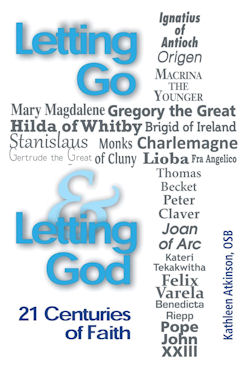
|
Posted September 17, 2013
Book: Letting Go, Letting God: 21 Centuries of Faith Kathleen Atkinson, OSB Liguori, Liguori Missouri. 2013. Pp. 141 An Excerpt from the Jacket:
When the struggles of the day drown out God's voice, we begin to question --- how will we go on? Even extraordinary witnesses of faith had moments of questioning as they considered the difficulties that lay before them. They learned to let go and trust God. In Letting God and Letting God: 21 Centuries of Faith, Kathleen Atkinson, OSB examines the lives of holy people from each century, who strove to listen to the still, small voice of God. Then, taking courage from God's nearness, each person let go and let God work through him or her. God is calling you to join this cloud of witnesses. This is your century. As God leads you to witness to his goodness and love, listen to him and let go of all that holds you back. Let God lead you through difficulties to abundant life in him. An Excerpt from the Book: Gregory the Great [540-604] Servant of the Servants of God A youth of great wealth and power Yet he considered himself the servant of the servants. Abbot of the monastery Yet he considered himself the servant of the servants. Leader of the Roman Catholic Church Yet he considered himself the servant of the servants. Father of the Western Church Yet he considered himself the servant of the servants. Pope Gregory I, popularly known as Gregory the Great, was born in Rome in 540, the son of a Roman senator and administrator of the seven regions of Rome. He descended from a long line of Roman nobility with allegiance to the Church: two previous popes were in his family lineage (Felix III and Agapetus I) as well as several nuns. Gregory served as prefect of the city of Rome from 573-578, responsible for finances, police, and public works. During this time he developed administrative skills that served him well when, upon the death of his father, he distributed his great wealth and turned the family home into a monastery. From this monastery sprang several others, while Gregory committed his energy to the study of Scripture and the rhythm of the monastic life. His administrative skills did not go unnoticed, however, and in 579, Pelagius II ordained Gregory a deacon and sent him to Constantinople as the Pope's personal emissary. Even as part of the imperial court, Gregory sought to live a monastic life and was elated when he was recalled to Rome in 586 to serve as abbot of the monastery of St. Andrew. In 589 a flood swept through Rome destroying the giant reserves and instigating a famine. This was followed by a plague that killed many, including Pope Pelagius in 590. Gregory was elected to succeed him, and though reluctant, he went to work with vigor and expertise. Gregory's first act was to organize penitential processions to the seven churches of Rome to pray for the end of the plague. He then organized systematic relief for the poor refugees who had come to the city. Gregory ordered his clergy to seek out the poor and care for them. He increased production of food on the vast lands that were held by the Church and made distribution to the needy a priority; monks brought food to those who were too ill to collect it themselves. Furthermore, Gregory himself was engaged in the preparation and delivery of food and did not take any for himself until all others were fed. Gregory than set about reforming the Church itself. He removed Church officials “for pride and misdeed,” enforced celibacy, and reorganized the vast wealth of the Church to put it at the disposal of all the baptized rather than the powerful individual clergy. During the thirteen years Gregory served as pope, not only did he reform the Church through his organizational changes, but he was a prolific writer. His On Pastoral Care, a handbook for the instruction of bishops served as a primary manual throughout the Middle Ages, believing that preaching was one of the clergy's primary duties. Gregory conducted a preaching tour of area churches and published his homilies. During his papacy Gregory also published his Dialogues, a history of the lives of Italian saints. He also made sweeping changes to the Roman liturgy and wrote more than 800 letters to the Eastern churches in an attempt to keep union with Rome. Gregory's appreciation for church music has been recognized by the giving of the name (“Gregorian”) to the plainsong chant that he promulgated. In 596 he sent Augustine along with forty monks, as missionaries to Britain. Table of Contents: Mary Magdalene Ignatius of Antioch Origen of Alexandria Macrina the Younger Brigid of Kildare Gregory the Great Hilda of Whitby Boniface Charlemagne Monks of Cluny Hildegard of Bingen Thomas Becket Gertrude the Great Fra Angelico Joan of Arc Peter Claver Kateri Tekakwitha Felix Varela Benedicta Riepp Pope John XXIII This is your century |
|
